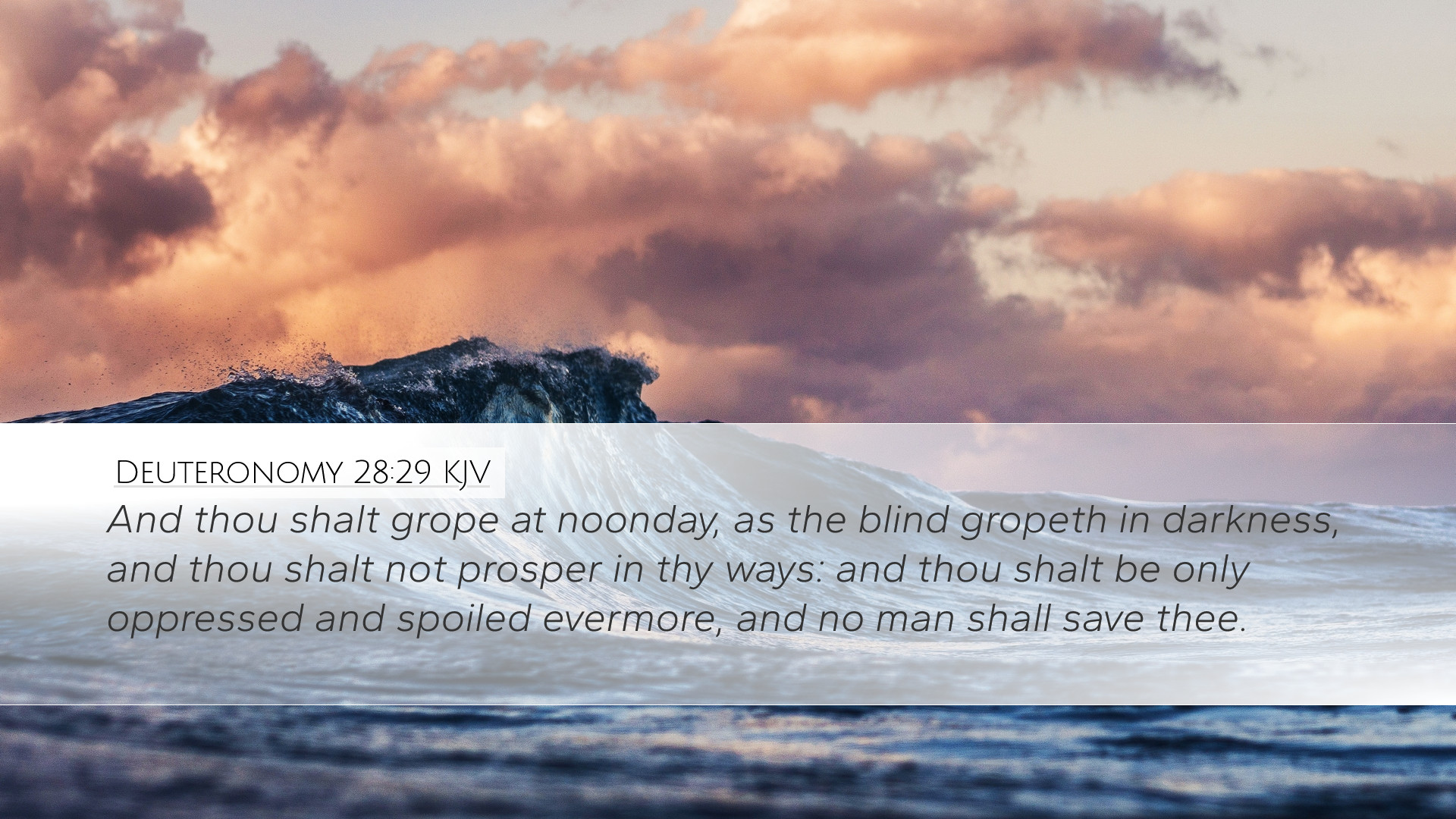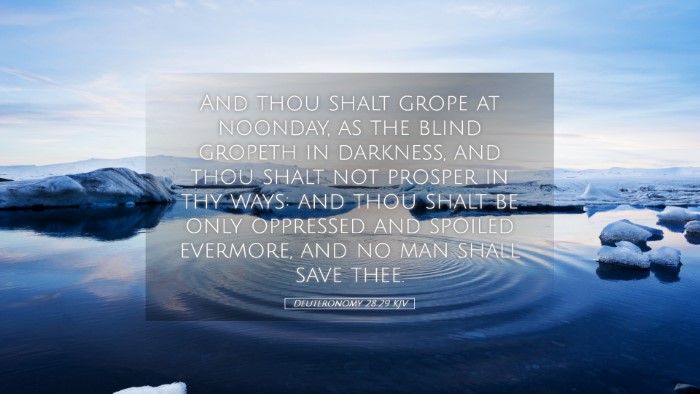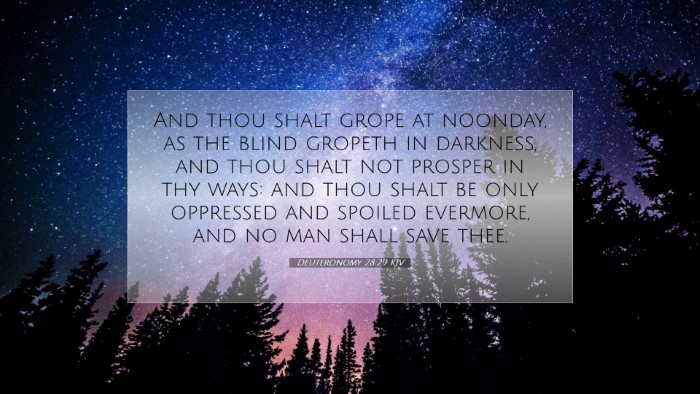Commentary on Deuteronomy 28:29
Verse Text: "And thou shalt grope at noonday, as the blind gropeth in darkness, and thou shalt not prosper in thy ways: and thou shalt be only oppressed and spoiled evermore, and no man shall save thee."
Introduction
This verse from Deuteronomy presents a solemn warning of the consequences of disobedience to God’s commandments. In the context of the blessings and curses outlined in this chapter, it is a metaphorical depiction of the spiritual blindness and confusion that comes upon those who stray from God’s path. Commentaries from Matthew Henry, Albert Barnes, and Adam Clarke offer valuable insights into the meaning and implications of this verse.
Contextual Background
The Book of Deuteronomy is framed as a series of sermons delivered by Moses before the Israelites enter the Promised Land. Chapter 28 details the blessings for obedience (verses 1-14) and the curses for disobedience (verses 15-68). Verse 29 sits within the broader context of these curses, illustrating the dire spiritual and physical conditions that befall a nation when it turns away from God.
The Metaphor of Groping
Blindness in Daylight: The imagery of groping in darkness is vivid and powerful. According to Matthew Henry, this reflects the spiritual and moral confusion of those who have rejected God. Albert Barnes emphasizes that such groping symbolizes a lack of direction and understanding, signifying how those who stray from God's teachings are left to navigate life without divine guidance.
Spiritual Implications: The notion of groping in broad daylight speaks to the absurdity of the situation; it indicates that despite being surrounded by opportunities for knowledge and wisdom, the disobedient remain in darkness. As Adam Clarke points out, this emphasizes the futility and desperation of their condition, as they are incapable of finding their way back to a state of blessing.
Prosperity and Oppression
This verse clearly contrasts the lack of prosperity with the presence of oppression and spoilage. Matthew Henry elaborates on this by noting that true prosperity extends beyond mere financial gain; it encompasses peace, stability, and spiritual contentment. However, those who disobey God will find themselves in a cycle of continual oppression, devoid of hope or help.
- Oppression: This indicates both external oppression from enemies and internal oppression of the soul. As Albert Barnes illustrates, the sense of despair and hopelessness also leads to self-inflicted wounds due to a lack of spiritual insight.
- Spoilage: The term suggests degradation and loss, highlighting that disobedience leads not only to spiritual decay but also to a tangible decline in one’s circumstances. Adam Clarke warns that individuals or nations, when cut off from God, face the inevitable tearing away of all that is good and sustaining.
Divine Abandonment
"...and no man shall save thee." This haunting conclusion signifies the absence of any human recourse or solution to dire circumstances. Matthew Henry reflects on the utter helplessness of those under God’s curse, as they find that all earthly powers and alliances fail them. It serves as a reminder of the essential truth that ultimate salvation comes from God alone.
Albert Barnes adds that this phrase underscores the idea that in the absence of divine favor, human efforts are futile and unavailing. The clarity of this realization can lead one to turn back to God, recognizing that He alone is the source of true salvation and deliverance.
Theological Reflections
This verse invites deep theological reflection regarding the relationship between obedience and the experience of God’s blessings. Adam Clarke argues that such warnings underscore the seriousness with which believers must take the covenant relationship with God. Understanding the dire consequences of sin can provoke a heartfelt repentance and return to the path of righteousness.
- Covenantal Relationships: Believers are reminded that their relationship with God is not merely transactional but transformative. Obedience leads to blessings, while disobedience leads to consequences.
- Spiritual Insight: Churches and communities must cultivate an awareness of the spiritual blindness that can result from disobedience. This scripture serves as both an admonition and an encouragement to seek God continually, particularly during times of trial.
Conclusion
Deuteronomy 28:29 serves as a poignant warning of the consequences of straying from God's commandments. It highlights the devastating impact of spiritual blindness, the futility of reliance on human solutions, and the essential truth that true salvation and prosperity are found only in God. The insights from Matthew Henry, Albert Barnes, and Adam Clarke converge to provide a holistic understanding of this verse, urging both individual and communal reflection on the essence of faithful living.
May this commentary inspire pastors, scholars, and students alike to delve deeper into the richness of Scripture and to seek an abiding relationship with the God who desires to bless His people. As we grapple with the reality of blessings and curses, let us remain steadfast in our commitment to following God’s ways amidst the challenges of life.


